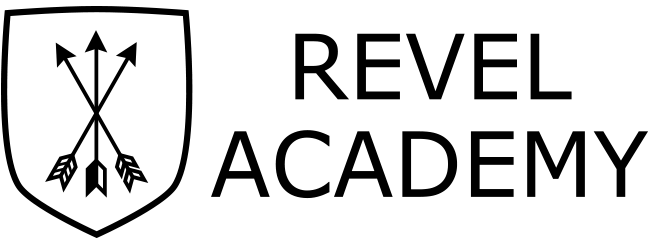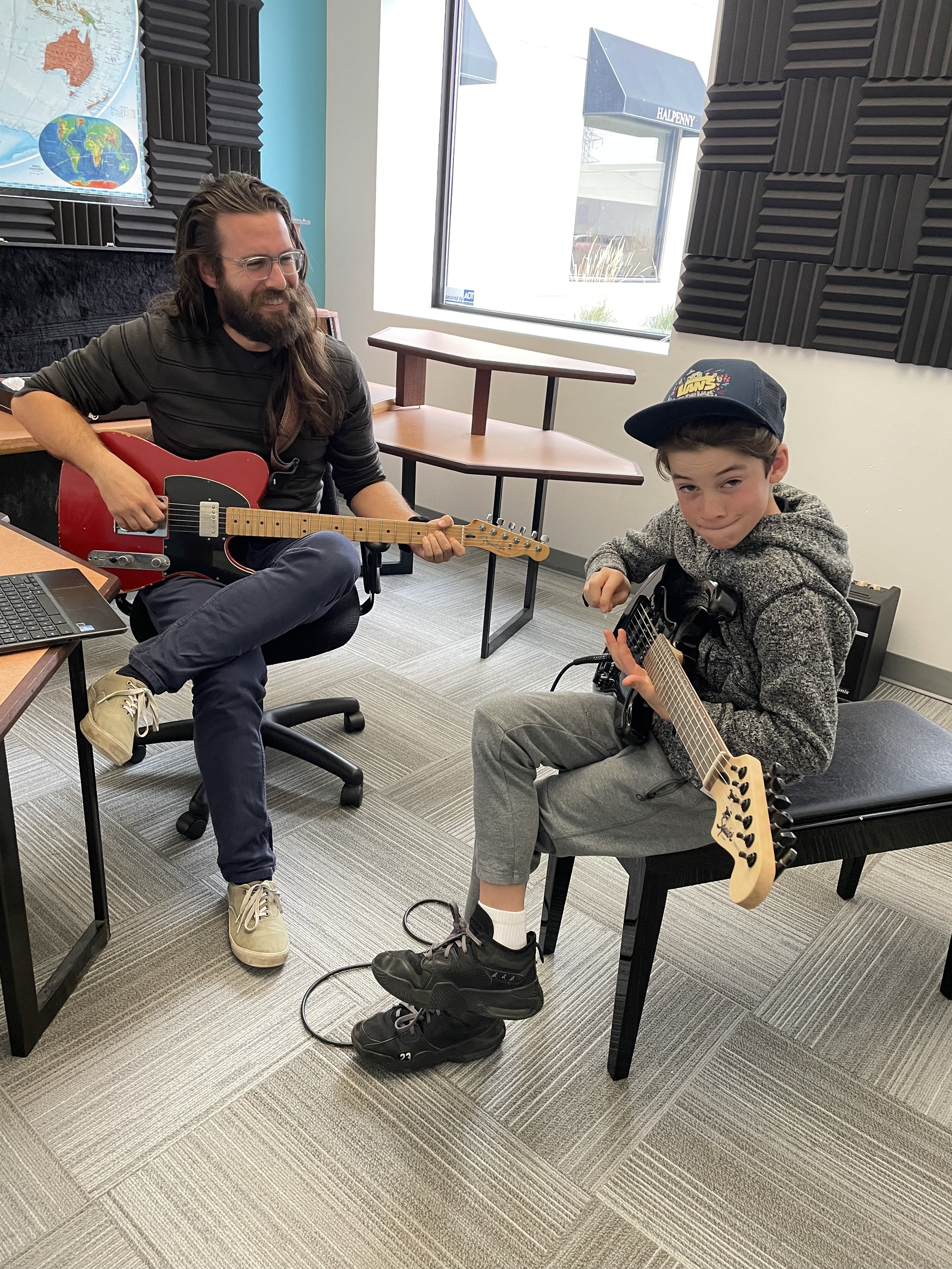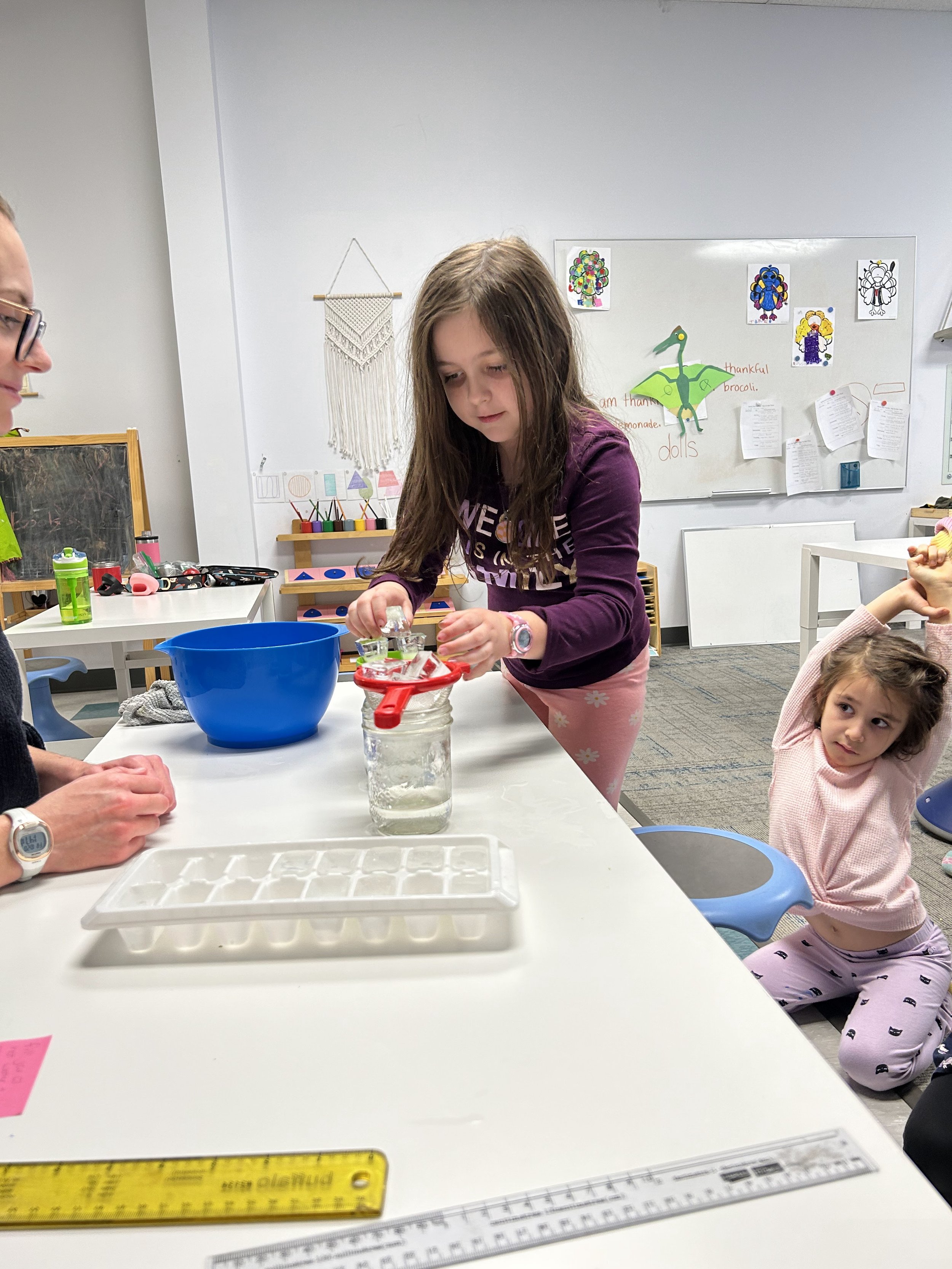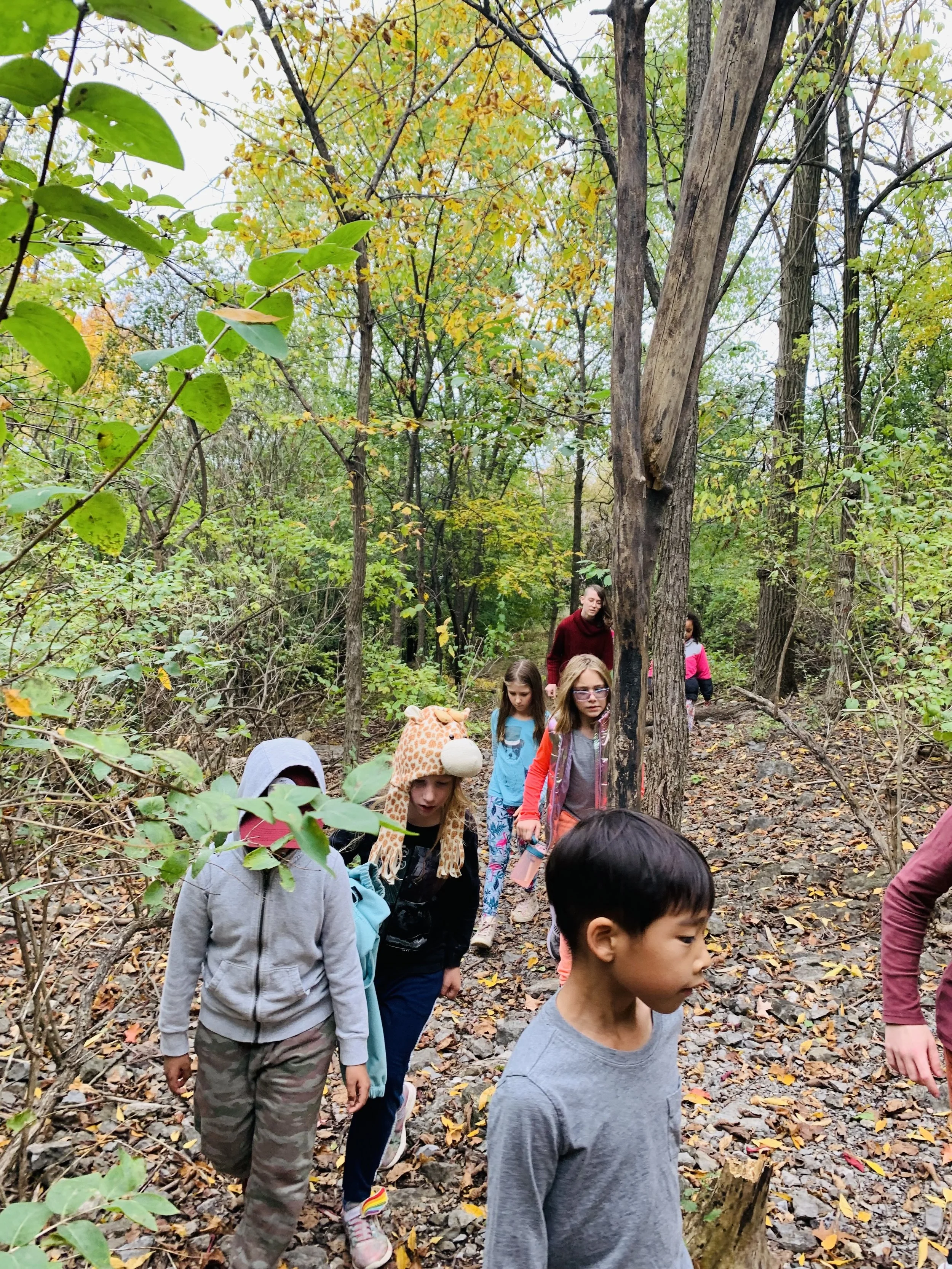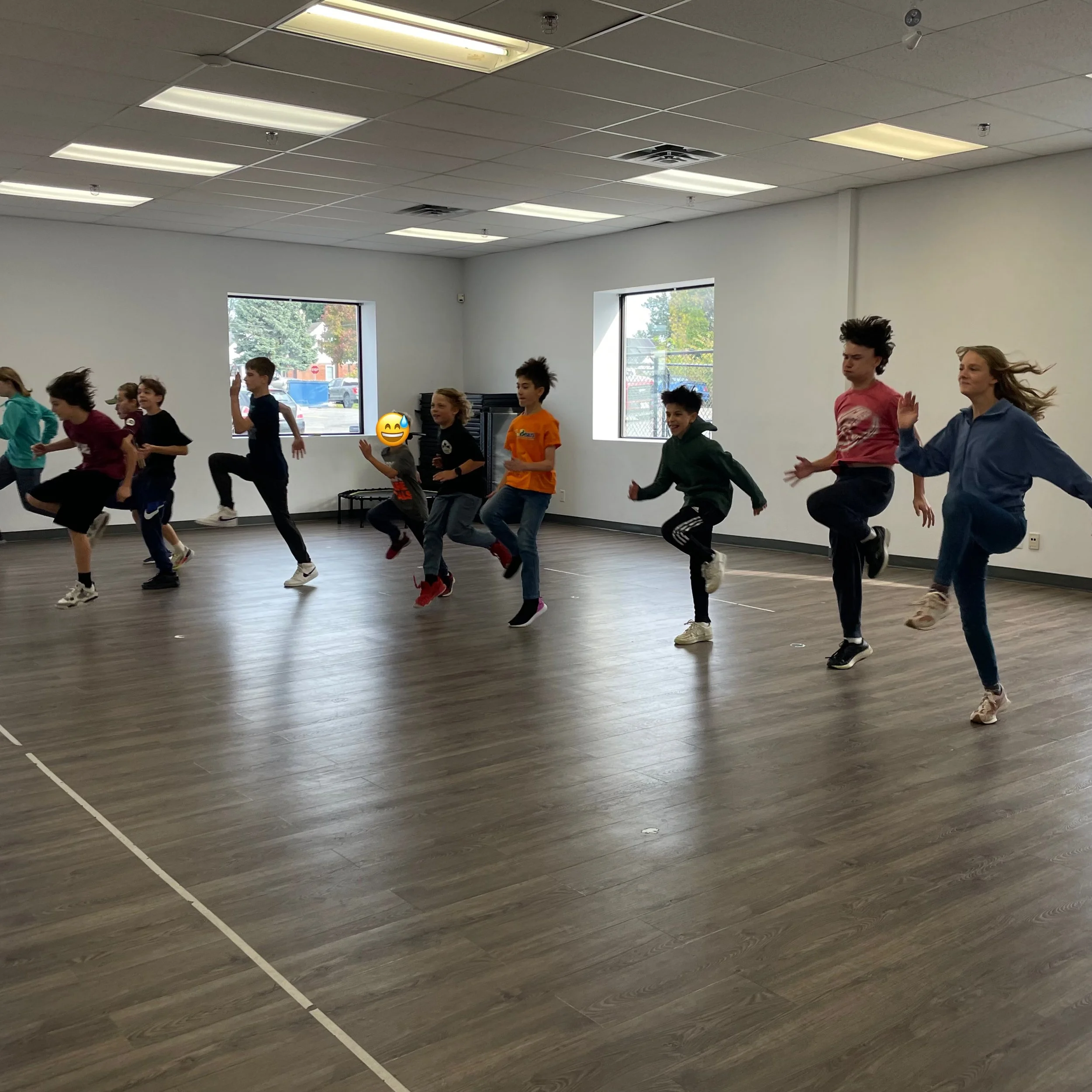Revel Recap: October 16 - 20, 2023
Spark Studio
Mindfulness
Welcome to Session 2! Some of our mindfulness activities this week centred around our new Quest weather theme. On Monday, we began our day with a guided meditation called "Breath of Thunder." The Sparks did a great job relaxing on their yoga mats, listening to the sound of the rain and following the breathing cues of the meditation. On Tuesday, our picture for mindful colouring invited the learners to design their dream rain boots. We have a creative group, and colouring is always a fan favourite in the Spark Studio! We challenged ourselves to complete some weather-themed yoga poses Wednesday morning, while on Thursday, we began with a directed drawing of a cute fall gnome! To end our week of mindfulness, we read a rhyming book called Thankful. This gratitude book is all about the little things we can be thankful for. Then, we each had a turn to roll a die and answer the gratitude prompt. The Sparks used these prompts to write in their gratitude journal after sharing their answers in our circle.
Quest
Welcome to the fascinating world of weather! On Tuesday, we started our Quest by filling out a KWL chart (know, want to know, learned). We already have some weather experts in our studio who have much weather knowledge to share! We will keep building on this chart throughout the session and display it at the Exhibition for families to see our learning progress. Next, we watched a video by SciShow Kids about being a weather watcher. First, we started our own weather graph! For the rest of the session, we will track the weather and see what data we collect by the end of Session 2. This week, we also started learning and rehearsing a weather song that we are excited to share with our families at the end of the session.
Two books this week that helped us with our weather inquiry were Weather Words and What They Mean and All About Weather. These books explained more in-depth terms such as air pressure, moisture, and temperature. They also explained how clouds form, why it rains, and what causes rainbows and storms. These books also had lots of fascinating weather facts. The Sparks were surprised to learn that clouds can weigh as much as 100 elephants! This week, we also discussed the different seasons here in Canada and what types of weather we can expect. The learners then drew pictures of themselves and what they would wear in each season. At the end of the week, we used loose parts to create a weather scene and completed an experiment where we tried to make fog in a jar! We also had our special show and tell where the Sparks shared items they brought in related to their favourite season. Stay tuned next week for extreme weather!
Reader/Writer Workshops
This week, we began working on some high-frequency words. These words are used often in reading and writing. Some of these words are phonetically decodable, and some have irregular spelling. Over the year, we will be learning both Flash Words (decodable words) and Heart Words (irregularly spelled words where a part of the word will have to be "learned by heart"). We have started with VC (vowel/consonant) words. This week, we focused on the words at, on and in. See if your learner can find these words when reading books together or when you are out and about on signs or posters!
For writing this week, we continued to work on using capital letters at the start of sentences and leaving spaces between words. We used the writing prompt, What is your favourite type of weather? to guide our writing practice.
French
To enhance our Quest lessons, in this session, we will also learn about the seasons, the months of the year, and the clothes to wear for each type of weather. On Monday, we did a colouring activity to learn about the different kinds of weather. On Tuesday, we started practicing naming and writing the four seasons. We went to the gym on Thursday to review our colours and animals in French. It was so much fun!
Geography
For Geography this week, we read the book Me on the Map by Joan Sweeney. In the last session, we focused a lot on the continents. This book was an excellent introduction to a more in-depth look at where we live and how we fit into the world. As we went through the story, we saw the main character in her room, house, street, town, state, country, continent and planet. Next, we started a project based on what we had learned. We completed two pages, illustrating and writing which planet and continent we live on. We will explore and add to this throughout the session and can't wait to show you the finished piece at the end of November.
Math
We met for our weekly math workshop and continued with our counting practice. We used our number boards and cards this time and placed them out of order. The Sparks showed a strong understanding of recognizing the numbers 10-60 out of sequence. Next up was a weather-themed graphing activity. Each Spark received a die to roll (an excellent tool for practicing the skill of subitizing) as the learners worked on equating the pattern on the face as a number without needing to count the dots. Learners would roll a die, and each number corresponded to a different type of weather. They would then record their data to create a bar graph illustrating which number they rolled the most and which rolled the least.
Additional Highlights
The Sparks were hard at work this week, selecting activities from the shelf to work on. We also set up some centres where the learners could practise folding clothes, using loose parts to make an autumn tree, and a weather-themed write-the-room challenge. This week, we also read the book Pumpkin Pumpkin and used it to reference the stages of the pumpkin life cycle. After sharing our experiences of growing pumpkins or visiting pumpkin patches, each learner took the time to illustrate the six steps of the pumpkin (seed, sprout, vine, flower, green pumpkin, orange pumpkin). In the middle of the page, they drew how they would like to carve their pumpkins this year!
We are so grateful for our fun adventure to Saunders Farm this week. We had a beautiful day outside, enjoying the jumping pillow and many playgrounds. A Spark highlight was the Witch's Mountain giant slide! We also went on a wagon ride to see a growing apple orchard, attended a pumpkin presentation where we learned about different types and the pumpkin life cycle and shared some laughs at a puppet show! It was such a wonderful day spent with our Discovery friends!
Discovery Studio
Mindfulness
On Mantra Monday, the Rebels listened to the story The Smartest Giant in Town by Axel Scheffler and Julia Donaldson. They tried out the mantra, "I am the smartest, kindest hero," and thought about all the week's significant events like the IOWA testing and the Saunders Farm field trip. Rebels completed fall/Halloween-themed Mindful Mazes and Zen doodles while listening to classical music on Tuesday. On Wonder Wednesday, the Rebels used their time to prepare for the bus ride to the Saunders Farm field trip, while on Thursday, the Rebels wanted to have a mindful talk with conversation cards. For Feel-Good Friday, they worked on their chord warm-ups and picked some new Boomwhacker tunes to try this session!
Launches
Monday's launch was an equip launch to help the studio prepare for IOWA testing. We discussed the who/what/when/where/why, and how of this assessment, and the Rebels geared up for it as an opportunity to see where they are at on their journey (rather than an exam to worry about). Tuesday, Rebels watched the short film "For The Birds" and discussed whether or not being part of a group can influence your behaviour. How does a group of individuals decide how they want to treat someone? Does it begin with one individual? Is it the fault of that individual or those who choose to follow suit? We were already on our way to Saunders Farm on Wednesday, so on Thursday, we used our launch time to keep working on IOWA testing or Core Skills. Friday's Current Events report featured a Rebel karting update, an ad from the Yearbook Club, and a discussion about what, if anything, the Rebels knew about the recent conflicts in the media. Some made a connection to the Middle East, Israel and religion, while one Rebel brought up the idea of wanting land. We started by looking at Google Maps, noting that the borders in that area are dotted lines. We concluded that this meant the borders were not agreed upon and that this is one aspect of the very complex Israel-Hamas conflict. We focused on how to digest the deeply sad (and very scary) news and what questions they had that we could learn more about together. Some want to know, what is the reason for this war?
Reader/Writer
Rebels started their first Double-Session Reader/Writer Badge on Fictional Writing this week! Rebels were introduced to the concept of Fractured Fairy Tales as their mentor texts for the fiction genre. Rebels discussed and questioned the idea of Fractured Fairy Tales and how sometimes we can take fictional stories and tell them from a different character's perspective to tell an entirely new story. Using Fractured Fairy Tales as a guide, Rebels will create their own fictional/fantasy children's books and present them at our Session 3 Exhibition "Book Launch" before the holidays.
Math Lab
As we were at Saunders Farm this Wednesday, our Session 2 Math Lab will start next week!
Civilizations
This session started with the Code of Chivalry established by the Christian Church in England and the ways of the samurai in Japan. The story compares and contrasts these two countries' use of a feudal system. This week's story took them through the evolution of a young page to a squire to a knight, and the Rebels discussed whether or not these ways of life were honourable and if these systems were fair to all. The Rebels also had time to map the islands of Japan.
Quest
Welcome to The Candy Quest! Wait, candy?! Rebels discussed the different elements we would be exploring this session through the lens of candy and candy production: from developing more robust research and media literacy skills to exploring the gastronomy and chemistry of candy, Rebels will take what they've learned in the first half of the session and apply it to creating and marketing their very own edible slime for our Exhibition, "The Slime Show." Rebels started our first week sharpening their research skills as we dove into the historical timeline of candy worldwide. Rebels began with a Research Challenge that focused on the importance of keyword selection when using a search engine. Rebels then selected a brand of their choice and spent three days researching and creating a poster board infographic including the history, nutritional label, how the packaging and logos have changed over the years, and fun facts about their candy. The infographics will be on display in Week 6!
Next week, Rebels will dive into the media literacy component of the Quest as we discuss advertising and marketing techniques in the candy industry and think critically about how candy companies might be targeting youth in their advertising campaigns.
Physical Development
On Tuesday, we took advantage of the lovely autumn weather, and both groups headed outside for P.E. Some chose free play at the playground. In contrast, others reviewed the rules of basketball and practised dribbling and different passes before having a friendly game! On Thursday, Alex Mateas joined us for one of our P.E options and led a workshop on strength, endurance and performance!
French
For this session in French, our theme will be all about museums! We'll learn greetings, the months and days of the week, and how to give directions. This week, we listened to three short videos on; What is a museum? What is a museum for? and Who works in a museum? With the foundation in place, Rebels began thinking about the setup of a museum and started looking for objects we'd like to display.
Additional Highlights
On Tuesday, some Discovery Rebels represented Revel at the Spooky Sprint Pumpkin Run at Wesley Clover Park! Rebels ran their hearts out through the forest on 2 - 2.5 km trails and then celebrated with mini pumpkins to take home. Way to go, Rebels!
The field trip to Saunders Farm was SO. MUCH. FUN! Rebels got to ride a wagon through the world's only circular apple orchard (designed in homage to the farm's spiral logo). They also could have free play in the a-mazing mazes, the arcade, the bouncy pillows and more! Many chose to enjoy a puppet show as well.
Exploration
Mindfulness and Launch
Wow, what a busy first week of the session! Since our learner-driven conferences began this week, we took Monday morning to learn about and practise running these very important meetings. In what order will we show our Goal Sheets and Badge Plans? What accomplishments are we most proud to celebrate, and what areas do we need more support? We also chose a Running Partner to help us stay accountable throughout this session on top of our Friday Triad meetings. On Tuesday, most of our studio travelled to Wesley Clover Park for the annual Spooky Sprint Pumpkin Run, so we reviewed logistics before getting on the bus. Tuesday afternoon, we discussed various test-taking strategies in preparation for the IOWA exam we'll be taking next week. We completed a directed drawing of an ice cream cone Wednesday morning before learning about the Yearbook Cover Design contest run by the Yearbook Club and getting an early start on core skills. After yoga on Thursday, we were reminded about our Service and Leadership log tab on our Google Goal sheets, which will help us track the hours we use to improve Revel and the greater community. After Free Choice Friday, where many Rebels chose to work on starting a Lego Treehouse kit, we had a great learner-led Current Events presentation.
Quest - The Science of Where
Welcome to The Science of Where Quest, Rebels! On Monday, we completed a video scavenger hunt to break down and visualize the enormous discipline known as geography and understand what geographic information systems (GIS) are and what they can do. Rebels quickly noticed that location intelligence is tied to a multitude of industries and processes all over the world. Some chose to work in groups and discuss as they watched, noting, for example, what types of data and maps were used to help during the initial COVID-19 crisis. Rebels also explored a brief background on the Environmental Systems Research Institute (ESRI), the developer of ArcGIS, the online platform we will use later to author our story maps. Tuesday and Wednesday, the Rebels had time to choose two existing story maps and go deeper. For example, some chose to review data on topics like the opioid epidemic, while others decided to explore redlining history. We also started the Geo Warm-Ups Leaderboard, where Rebels will work throughout the session to complete a series of timed Canadian geography quizzes. Through these warm-ups, Rebels are becoming more adept at identifying the major political regions of Canada and their capital cities as well as geophysical regions. The Rebels came together using the jigsaw method to compare notes about the various story maps in topic-specific groups on Thursday. Then, they shared their key findings with the whole studio, resulting in a list of excellence criteria for the future maps that the Rebels will author.
Math Lab
Welcome to the Detour of a Lifetime! Stranded on the coast of Dungeness, Washington, USA, Rebels must make their way home to Ottawa after their Victoria whale-watching tour boat had to make an emergency docking at a foreign port. To get started, Rebels used their lab time this week to better understand credit cards. They will use an emergency credit card with a limit of $ 5,000 to make all purchases required on the journey home. They had to choose between a President's Choice Financial Mastercard, Toronto-Dominion Cash Back Visa Infinite, or Scotiabank American Express card based on varying factors like annual fees, annual percentage rate (APR), foreign transaction fees, and other rewards like Optimum points, cash back, or Scene points. Next week, we will investigate currency and exchange rates as they make their first travel decisions to get back across the American-Canadian border.
Reader/Writer
As the majority of the studio was at the Spooky Sprint on Tuesday morning, we will begin the Session 2 Reader/Writer workshop next week.
Civilizations
In his novel Guns, Germs and Steel, evolutionary biologist Jared Diamond's experiences in Papua New Guinea led him to propose geography as a prime drive of civilization. In this session, we will be using this text as the backbone of our Civilization discussions. On Tuesday and Wednesday of this week, we began by watching a portion of the Guns, Germs, and Steel documentary, where we learned more about Papua New Guinea and Diamond's theories about why there are differences in different civilizations' amount of "cargo," farming techniques, and innovations. We then assembled as a studio to answer and discuss a series of complex questions. For example, Imagine you want to create a new civilization but have only a limited amount of money. Would you choose a location with great weather, resources or on a trade route, attract skilled workers, craft a freedom-friendly constitution with protections for individual rights and property, or invest in advancing technology?
French
To practice and improve at asking various questions in French, we will utilize Mystery Games and Escape Rooms! This week, we completed a Kahoot on household vocabulary to refresh our memory. Then we worked on open and closed questions and reverse verb questions to prepare ourselves to be good detectives in French next week for our murder mystery game.
Additional Highlights
Fourteen of our eighteen Exploration learners attended the Spooky Sprint at Wesley Clover Park on Tuesday! We had perfect weather for the cross-country event, and the learners did a fantastic job running 2.5 - 3 km and cheering one another on!
On Thursday, Alex Mateas joined us for one of our Physical Development options and led a workshop on strength, endurance and performance!
Several of the Exploration Rebels also took part in a soccer tournament with a few other private schools on Friday! They won each game, but more importantly, they showed incredible sportsmanship! It was awesome (yet expected) hearing them cheer one another on, never vocalizing frustration with one another. Our Rebel Captain gave great positive feedback in between halves and helped to make sure everyone played the positions they wanted! Go, Rebels!
Launchpad
Classical Physics
Welcome to the World of Physics! Our study of classical physics will consist of simple machines, bungees, pulleys, levers, projectiles, and much more, many of which have huge implications. The next six weeks will be full of theorizing, experimentation, and ultimate excitement, culminating in a Physics Olympics event! On Monday, we reviewed the Quest layout, and each learner received the Lab notebook, which they will use throughout the year. We reviewed the expectations for our notes, data, graphs, and images, including headings, labels, and units, and ensured we always used pen and struck out mistakes with one line. We then began our exploration with a car competition! Learners had 30 minutes to build a car using the materials provided they felt could travel the farthest distance. With several ramps to use for testing, Rebels voted as a studio, which one everyone would use for the final competition. We also discussed variables and attempted to make the experimentation as fair as possible, including the length and angle of the ramp, the surface the car would be tested on, which set of wheels would be placed at the top of the ramp, and the amount of force that would be allowed to push the car down the ramp.
At an amusement park, why is the first summit on a roller coaster the highest, and why are the following arcs lower in height? In ancient times, people had great difficulty lifting huge loads, yet today, simple pulleys or pistons can be employed to lift heavy loads unimaginable in past times. How do pulleys and pistons so significantly increase output force? Tuesday, we turned our attention to work, power, and energy. Using our PocketLab notebook, we learned about these concepts through a series of readings, videos, comprehension questions and quizzes!
On Wednesday, we participated in the second half of our car competition that began on Monday. This time, however, learners were tasked with fine-tuning their vehicles to stop closest to a specific spot. Rebels worked hard to test and adjust their prototypes, noting their thought process, changes, and subsequent results in their lab notebooks.
If you want to advance beyond trial and error and into the world of theory and equations, you must learn a basic set of vocabulary and concepts. Once the accuracy competition was over, learners got into groups of three to learn about displacement, velocity, and acceleration on Wednesday and Thursday. They researched the difference between scalars and vectors and learned about position and the difference between distance and displacement. They then dove into velocity and acceleration and their associated units, as well as the difference between speed and velocity, acceleration and velocity, and force and acceleration.
Lastly, on Friday, learners who were not at the soccer tournament began their exploration of Newton's Three Laws and Free Body diagrams. With the chance to go back and re-examine the most fundamental rules of mechanical physics, Newton's Laws, they then picked up a new tool for systematically breaking down complex mechanical systems into simpler ones with the help of this interactive free-body diagrams site.
World History
Many consider Sumer the world's first civilization. Despite being lost from history until the 19th century, the Sumerian culture was rich and complicated. Among other notable achievements, the Sumerians had irrigation and division of labour. After completing at least 30 minutes of research, the Launchpad Rebels, who were not at the Spooky Sprint, gathered to discuss their findings and answer a series of Socratic questions.
With everyone back in the studio for Thursday, we learned about the Mesopotamians who lived in the Fertile Crescent between the Tigris and the Euphrates between 5000 BC and 3500 BC. Irrigation and agriculture were the basis of Mesopotamia, and they lived on small pots of land and wore light, simple clothes. Once again, learners broke off into small groups or individually to conduct their research using their own sources or the sources provided. With 20 minutes left in the period, we came back together, and a learner stepped up to lead our discussion on the value of surpluses of food, life as a teenager in Jericho in 9000 BCE, and what we would have done with our personal strengths in a similar civilization. Would we have been a farmer, a warrior, an advisor, a priest, or a writer of historical events, religious rituals, or perhaps our possessions/debts?
Creative Writing
We began our Creative Writing course with a guest Guide this week! To kick off the unit, we started with the basics. After introducing ourselves, we shared a piece of short writing that inspires us. We then discussed the different narrative voices, including first-person, second-person, third-person limited, and third-person omniscient. We then learned about story arcs, the five elements and what a typical story arc looks like. On Tuesday, Rebels shared a short piece featuring a compelling character. After reading the excerpts out loud, we discussed what makes each character so fascinating. We then worked together to reverse-engineer the characters, reverting each character into a character sketch, the first step of character research and development. As a group, we made lists of what we know, assume and sense about each character until we had a reasonably detailed character sketch.
Before Wednesday's class, Rebels were asked to create a new character sketch from scratch, including their name, age, gender identity, pronouns, race, sexual orientation, disability status, whether they are neurotypical or neurodivergent, hobbies, level of education, profession, whether they are in a relationship and with whom, whether they are a parent/grandparent or not (and if so, how many children, what are their ages, identities and names), where the character lives now, where they were born, why they left, and their values and political beliefs. We met on Wednesday and focused on using dialogue in creative writing. We learned about the two main types of dialogue and read through and discussed examples of both kinds. We also spoke about the four main purposes of dialogue in creative writing before writing our one-page, dialogue-only scene between two inanimate objects typically found together, ensuring the conversation fulfills one or more of the four purposes of dialogue in storytelling. Lastly, on Thursday, we learned three key pieces of writing advice: show, don't tell, write what you know, and get out of your own way! To cement these concepts, learners took a short example of "telling" and turned it into an example of "showing" by using sensory observations about the characters and their surroundings. We then chose one thing we knew well and thought about one way to incorporate it into our writing in the future. Lastly, we were asked to trust our creative instincts by regularly writing in a stream-of-consciousness style. We began by writing for ten minutes without stopping on a specific assigned topic.
French and Spanish
To practice and improve at asking various questions in French, we will utilize Mystery Games and Escape Rooms! This week, we completed a Kahoot on household vocabulary to refresh our memory. Then we worked on open and closed questions and reverse verb questions to prepare ourselves to be good detectives in French next week for our murder mystery game.
Meanwhile in Spanish our learner continued their online UC Davis course complete with grammar, written and listening exercises, and quizzes.
Next Great Adventure
This week, Launchpad began working on the Tell Your Story module. This week, they made progress on "The Whisper," "The Time Paradox," and "The Mystery Path" challenges. Check in with your learners for an update on their progress and learnings about themselves!
Additional Highlights
Three of our Launchpad learners also participated in this year's Spooky Sprint on Tuesday and the soccer tournament on Friday. Their leadership and incredible sportsmanship is a huge asset to our community!
Potential Discussion Ideas or Questions to Ask Your Rebel:
Spark Studio
What are the six stages of the pumpkin life cycle?
What was your favourite part of the field trip to Saunders Farm?
Can you find any of your flash words of the week in one of your books? (at, in, on)
Are clouds heavy or light?
What is your favourite type of weather and why?
How do you say autumn/fall in French? (automne)
Discovery Studio
Which candy did you choose for your Candy History poster? Can you tell me about some of the historical facts of that candy?
What keywords should I use to research how the candy "Fun Dip" was invented using Google?
What is a fractured fairy tale?
What was your favourite part about your field trip to Saunder's Farm?
What is the purpose of a museum? Have you thought about what you'd like to display in your museum?
Exploration Studio
Which GIS StoryMaps did you review this week, and what did you learn from them, OR what questions do you still have?
Which credit card did you apply for in Math Lab and why?
Agree or disagree; some civilizations will always try to conquer or replace others.
What is an inverted verb question in French?
Launchpad Studio
Do you believe the ability to transfer important truths about civilization has gotten easier or harder? Why? Is ubiquitous video as important as the invention of writing?
Which was the most surprising or difficult free-body diagram problem?
Imagine you are a ruler in ancient Sumer with a limited amount of treasure and you have to choose what to invest in. Which would you choose, and why? If you were the Prime Minister of Canada today, how would you answer the same question? Why?
stronger walls (military)
a more vibrant priesthood (religion)
better farming techniques (economic)
a fairer government (political)
or something else?
Dates of Interest
Rebel Guardian Onboarding - Self-Driven Child Book Club: Thursday, October 26th at 7:00 p.m. - The Self-Driven Child: The Science and Sense of Giving Your Kids More Control Over Their Lives Book Club (Read the book in advance and come ready to discuss.)
Halloween Red Carpet Celebration - Tuesday, October 31st, 9:00 a.m. - 9:30 a.m.
School Photos - Wednesday, November 8th and Thursday, November 9th
Session 2 Exhibitions
Spark - Wednesday, November 22nd, 4:15 - 5:30 p.m.
Discovery - Tuesday, November 21st, 4:15 - 5:30 p.m.
Exploration - Wednesday, November 22nd, 4:15 - 5:30 p.m.
Launchpad - Tuesday, November 21st, 4:15 - 5:30 p.m.
Sessional Break - Thursday, November 23rd and Friday, November 24th
